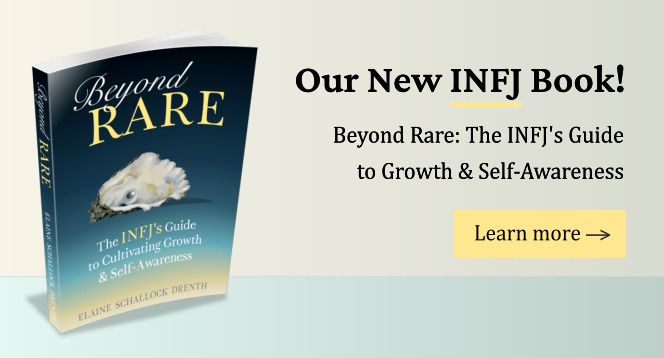
INFJs are outwardly warm and engaging. Due to their extraversion of Feeling (Fe), they can readily ingratiate themselves to others. And while forming quick friendships and extensive connections may be the goal for some extraverts, for INFJs, this is not the point at all. Rather, INFJs seek high quality, in-depth relationships. In their friends, as well as their romantic partners, they seek intelligence (both intellectual and emotional), honesty, openness, and authenticity. Their ideal partner would take seriously the issue of personal growth and development—moral, spiritual, emotional, and psychological.
Despite their status as introverts, there is little the INFJ values more than quality conversation. They relish the chance to share their wisdom, theories, and insights. Unfortunately, they often find that most people (especially S types) fail to fully comprehend or appreciate their theories and insights. This can leave INFJs feeling like there is no ready outlet for their wisdom and that no one really understands their essential worth or value. So if and when they happen upon a likeminded individual, one who values and eagerly partakes in the INFJs’ inner life, it can feel like a godsend. The title of David Keirsey’s book, Please Understand Me, aptly expresses what INFJs are seeking in their relationships.
Misunderstandings in INFJ Relationships
INFJs commonly report feeling misunderstood. Considering their status as the rarest of all personality types, this comes as little surprise. There are numerous misunderstandings about INFJs that could potentially hamper their dating and relational success.
A common assumption among males is that all females have similar perspectives on romance. This is particularly off the mark with respect to female INFJs. “Canned romance,” such as receiving the same bouquet of flowers every year come Valentine’s day, is apt to mean little to INFJs, who are quick to differentiate the “real and authentic” from the “fake and contrived.” For the INFJ, romance is cultivated on a daily basis through open communication and authentic action. What is done on special occasions is merely icing on the cake. Take away the cake, however, and the icing is meaningless.
Another common misunderstanding is that the INFJ is controlling or closed-minded. This typically stems from INFJs’ tendency to extravert Judging (Fe). But as I’ve described elsehwhere, IJs are often better understood as Perceivers because their dominant function (e.g., Ni) is a Perceiving function. In actuality, INFJs, especially those further along in their type development, are surprisingly adaptable and open-minded. While rarely wearing their openness on their sleeves, as ENFPs are wont to do, INFJs can be surprisingly open to unique or less conventional relational practices.
Another misconception about INFJs is that they are emotionally “needy.” This likely stems from the fact that INFJs extravert and readily express their emotions via Fe. INFJs differ from the cultural norm in this respect, as the emotionally-restrained presentation of Fi predominates among females. But just because INFJs are quicker to express their emotions does not make them any needier than FP types. In fact, since most men (i.e., TP males) use Fe rather Fi, they might appreciate the fact that, when paired with an INFJ, they needn’t guess about what their partner is feeling.
Yet another misunderstanding is the claim that INFJs “read into things that are not there” or “make mountains out of molehills.” Such accusations can be troubling for INFJs, since reading into things by way of their Ni is what they are born to do. In many cases, such accusations derive not from any wrongdoing on the part of the INFJ, but from the assumptions or ego sensitivities of their partners. For instance, by saying things like “Are you okay?” or “You don’t seem yourself today” INFJs are trying to gather more information in order to better understand their partner. But their partner may interpret these attempts as judgmental or intrusive and respond defensively. If such exchanges were to occur regularly and without rectification, the INFJ might begin to introvert her feelings and doubt her own intuition, a sure recipe for personal and relational disaster.
The Inferior Function in INFJ Love & Relationships
No relationship can be optimally navigated without an adequate understanding of each partner’s “weak spots.” The inferior can be problematic because it is both alluring and underdeveloped. It is like a child who desperately wants to get behind the wheel of a car because driving looks like so much fun. It is therefore critical that INFJs and their partners work to understand the nature of and challenges associated with the INFJ’s inferior function, Extraverted Sensing (Se). Having already enumerated the nature of their Se in my book, The 16 Personality Types, our focus here will entail facets of their Se that are particularly relevant to their functioning in relationships.
While there are numerous aspects of Se that can prove problematic in INFJ relationships, money is among the most prominent. INFJs love to be ensconced in beautiful surroundings. They appreciate fine food, furniture, clothing, and accommodations. Their concern for beauty and attraction to worldly things is somewhat similar to that of ESFPs, even if their tastes are ultimately rather different. But unlike ESFP, INFJs can have difficulty fitting into the modern working world and making a lot of money. Moreover, INFJs are slower to pair with S-types, for whom earning money often comes rather naturally. They can therefore feel stuck. They may desire, perhaps even envy, the ESP lifestyle, but they aren’t willing to sell their Ni soul to obtain it. This love-hate relationship with money and other Se desires is important for both INFJs and their partners to understand.
Se can also affect INFJs’ view of themselves and their bodies. They are as susceptible as other Se types to harshly judging their own physical appearance. They may even be prone to abusing their bodies, such as through harsh dietary or exercise regimens, in hopes of achieving their desired level of Se beauty.
Sex is another area in which their inferior Se plays a role. INFJs can have a love-hate, all-or-nothing approach to sex. At times, they may feel like addicts, at others, like renunciants. It’s not hard to imagine INFJs taking a vow of celibacy in hopes of eschewing such Se extremes. What is more, INFJs’ disconnectedness from their physicality may complicate the logistics of sex. INFJs often feel they have little awareness of, or control over, their bodies, including their level of sexual arousal and physical readiness for sex. This unpredictability can be a source of frustration for INFJs and their partners, especially if the issue fails to be discussed openly or understood more clearly. It’s not that INFJs cannot enjoy satisfying sex lives, but it is important for partners to understand this as another area in which INFJs (and INTJs) may differ from other types.
INFJ Compatibility with Various Personality Types
We’ve already discussed numerous qualities INFJs seek in a romantic partner, things like intelligence, openness, honesty, and authenticity. They may also be attracted to wealthy, physically attractive, or highly skilled (i.e., in some sort of Se performance) individuals, although such criteria are less pertinent to long-term compatibility. What INFJs may desire most is an intimate, metaphysical kinship. They want to convene with their partners in the world of language and ideas.
Once immersed in a conversation that interests them, INFJs can speak at great length as their Ni penetrates ever deeper into the issue. Unlike Ne types, however, they don’t enjoy randomly bouncing from one topic to the next. However, this does not necessarily preclude INFJs from finding good compatibility with Ne types (i.e., the ENTP, ENFP, INFP, INTP) as friends, lovers, or both. A primary function of Ne is listening—taking in N information from without. This can make NPs a good match for INFJs, who, as J-types, are more inclined to talk than listen. NPs are also good at asking questions, which can help jumpstart INFJs’ intuitive process.
As I’ve discussed elsewhere, one area in which INFJs may conflict with NPs is lifestyle. Since NPs use Si, they tend to be more fiscally conservative (especially INPs) and less entranced by “the finer things in life.” INFJs may balk at what they see as the frugal, second-hand shopping ways of some NPs. They may also crave more outer seriousness than NPs are inclined to display, especially in what the INFJ considers a serious moment or discussion; excessive silliness can be off-putting to INFJs.
Generally speaking, INFJs are ill-matched with Sensing types. As dominant Intuitives, INFJs live in a world of abstractions mediated by concepts and language. Since S types, especially SP types (ESTPs, ESFPs, ISTPs, ISFPs), prefer to relate through concrete action or activities, INFJs may struggle to find a common N denominator. While ISTJs and ISFJs can be somewhat more abstract in their ideation, INFJs may struggle with their deference to certain traditions or conventions.
Pairing with other NJ types can be a hit or miss affair for INFJs. Putting any two J-types together can seem a lot like opposing the positive poles of two magnets. When opposing J forces collide, relationships can be intense and fiery. This may be one reason that J-J pairings seem relatively uncommon. Moreover, if INFJs try to pair with an INTJ or ENTJ, differences conferred by their Fe-Ti and Fi-Te function pairs may further the likelihood of disagreements and misunderstandings.
On the rare occasion that INFJs happen upon and pair with another INFJ, there can certainly be grounds for attraction and intimacy. But because INFJs are among the least practical of all types, at times even oblivious to S matters, this pairing could prove difficult once children, money, or other logistical factors enter the picture.
INFJs may also discover quick rapport and chemistry with the ENFJ, who shares all of the INFJ’s personality functions. One potential drawback, however, could involve ENFJs’ tendency to project their own dominant Judging preference onto INFJs, expecting them to be more “productive” or proactive than they might naturally prefer. This could lead them to put even greater pressure on themselves, which is sure to bring relational trouble. But if circumstances were favorable and both partners were adequately self-aware, there is no reason that INFJ-ENFJ relationships could not be successful.
Learn more about INFJs—their personality, relationships, life struggles, paths to growth, and much more—in our new INFJ book:
Beyond Rare: The INFJ’s Guide to Growth & Self-Awareness
